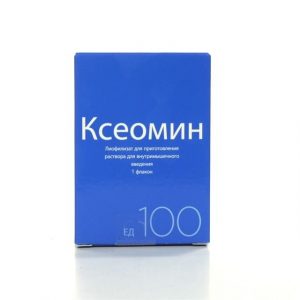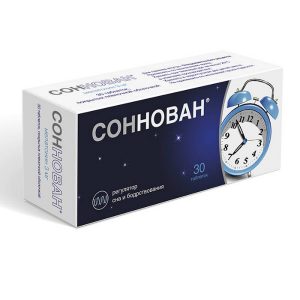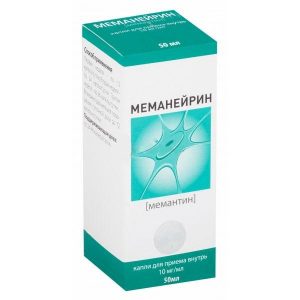Description
Release form
Tablets
Packing
30 pcs.
Pharmacological Action
Antidepressant. According to the chemical structure, venlafaxine does not belong to any class of antidepressants (tricyclic, tetracyclic or others), it is a racemate of two active enantomers.
The mechanism of the antidepressant action of the drug is associated with its ability to potentiate the transmission of a nerve impulse to the central nervous system. Venlafaxine and its main metabolite, O-desmethylvenlafaxine (EFA), are potent inhibitors of serotonin and noradrenaline reuptake and weak dopamine reuptake inhibitors. In addition, venlafaxine and EFA reduce beta-adrenergic reactivity both after a single injection, and with constant use. Venlafaxine and EFA equally effectively influence the reuptake of neurotransmitters.
Venlafaxine has no affinity for m-cholinergic receptors, histamine H1 receptors, and brain 1 -adrenoreceptors. Venlafaxine does not inhibit MAO activity. It does not have an affinity for opioid, benzodiazepine, phencyclidine or NMDA receptors.
Pharmacokinetics
Absorption
Venlafaxine is well absorbed from the gastrointestinal tract. After a single oral dose of 25-150 mg Cmax in plasma is 33-172 ng / ml and is achieved within about 2.4 hours. After taking the drug with food, the time to reach Cmax in blood plasma increases by 20-30 minutes, however, the values of Cmax and absorption do not change.
Distribution and metabolism
Intensively metabolized the first time it passes through the liver. Its main metabolite is O-desmethylvenlafaxine (EFA). Cmax EFA in plasma 61-325 ng / ml is achieved approximately 4.3 hours after administration. The binding of venlafaxine and EFA with blood plasma proteins is 27% and 30%, respectively.
With repeated administration of Css in plasma, venlafaxine and EFA are reached within 3 days. In the range of daily doses of 75-450 mg, venlafaxine and EFA have linear kinetics.
Excretion of
T1 / 2 of venlafaxine and EFA is 5 and 11 hours, respectively. EFA and other metabolites, as well as unchanged venlafaxine, are excreted by the kidneys.
Pharmacokinetics in special clinical cases
In patients with cirrhosis of the liver, plasma concentrations of venlafaxine and EFA are increased, and their elimination rate is reduced.
With moderate or severe renal failure, the total clearance of venlafaxine and EFA decreases, and T1 / 2 increases. A decrease in overall clearance is mainly observed in patients with CC below 30 ml / min.
The age and gender of the patient do not affect the pharmacokinetics of the drug.
Indications
Depression of various etiologies (treatment and prevention).
Contraindications
hypersensitivity
concomitant use of MAO inhibitors
severe impaired renal and / or liver function (glomerular filtration rate (GFR)
under 18 years of age (safety and effectiveness for this age group not proven)
established or suspected pregnancy feeding.
Use during pregnancy and lactation
The safety of venlafaxine during pregnancy has not been proven, therefore the use of the drug during pregnancy (or presumed pregnancy) is contraindicated. Women of childbearing age should be warned about this before starting treatment and should immediately consult a doctor in case of pregnancy or planning a pregnancy during treatment with the drug.
Women of childbearing age should use appropriate methods of contraception while taking venlafaxine.
If the mother s treatment was completed shortly before the birth, the newborn may have symptoms of drug withdrawal.
Venlafaxine and its EFA metabolite are excreted in breast milk. The safety of these substances for newborns has not been proven, therefore, taking venlafaxine during breastfeeding is not recommended. If necessary, take the drug during lactation should decide on the termination of breastfeeding.
Special instructions
Cancellation of the drug Venlaxor: as with other antidepressants, abrupt discontinuation of venlafaxine therapy – especially after high doses of the drug – can cause withdrawal symptoms, and therefore it is recommended to gradually reduce its dose before discontinuing the drug.
The duration of the period required to reduce the dose depends on the dose, the duration of therapy, as well as the individual sensitivity of the patient.
Ingredients
1 tablet contains venlafaxine 150 mg pdf hydrochloride 150 g (as hydrochloride) 37.5 mg.
Dosing and Administration
Tablets are recommended to be taken with meals.
The recommended starting dose is 75 mg in 2 divided doses (37.5 mg 2 times / day) daily. If after several weeks of treatment there is no significant improvement, the daily dose can be increased to 150 mg (75 mg 2 times / day).
If a higher dose is required (severe depressive disorder or other conditions requiring inpatient treatment), 150 mg in 2 divided doses (75 mg 2 times / day) can be prescribed immediately. After this, the daily dose can be increased by 75 mg every 2-3 days until the desired therapeutic effect is achieved.
The maximum daily dose of Venlaxor is 375 mg. After achieving the necessary therapeutic effect, the daily dose can be gradually reduced to the minimum effective level.
Supportive treatment (including for the prevention of relapse) may last 6 months or more. The minimum effective doses prescribed in the treatment of a depressive episode are prescribed.
Side effects
General symptoms: weakness, fatigue.
From the gastrointestinal tract: decreased appetite, constipation, nausea, vomiting, dry mouth rarely – hepatitis.
From the side of metabolism: increased serum cholesterol, decreased body weight, sometimes – a change in laboratory tests of liver function, hyponatremia, syndrome of insufficient secretion of antidiuretic hormone.
From the cardiovascular system: hypertension sometimes – postural hypotension, tachycardia.
From the nervous system: unusual dreams, dizziness, insomnia, increased irritability, paresthesia, stupor, increased muscle tone, tremors, yawning sometimes – apathy, hallucinations, muscle cramps, serotonin syndrome rarely – epileptic seizures, manic reactions, as well as symptoms, resembling malignant antipsychotic syndrome.
From the genitourinary system: disturbances in ejaculation, erection, anorgasmia, dysuric disorders (mainly difficulties at the beginning of urination), sometimes – decreased libido, menorrhagia, urinary retention.
On the part of the sensory organs: disturbances of accommodation, mydriasis, visual impairment sometimes – a violation of taste sensations.
From the skin: hyperemia of the skin sweating sometimes – photosensitivity reactions rarely – erythema multiforme, Stevens-Johnson syndrome.
From the blood and hemopoietic system: sometimes – hemorrhages in the skin (ecchymosis) and mucous membranes, thrombocytopenia rarely – prolongation of bleeding time.
Drug Interactions
The simultaneous use of MAO inhibitors and venlafaxine is contraindicated. Venlaxor can be taken no less than 14 days after the end of therapy with MAO inhibitors. If a reversible MAO inhibitor (moclobemide) has been used, this interval may be shorter (24 hours). Therapy with MAO inhibitors can be started no less than 7 days after discontinuation of Venlaxor.
Venlafaxine does not affect the pharmacokinetics of lithium.
With simultaneous use with imipramine, the pharmacokinetics of venlafaxine and its metabolite EFA does not change.
With simultaneous use with haloperidol, the effect of the latter may be enhanced due to an increase in its concentration in the blood.
With simultaneous use with diazepam, the pharmacokinetics of drugs and their main metabolites does not change significantly. Also, no effect on the psychomotor and psychometric effects of diazepam was found.
With simultaneous use with clozapine, an increase in its concentration in blood plasma and the development of side effects (for example, epileptic seizures) may be observed.
With simultaneous use with risperidone (despite an increase in AUC of risperidone), the pharmacokinetics of the sum of the active components (risperidone and its active metabolite) did not change significantly.
Venlaxor enhances the effect of ethanol on psychomotor reactions.
The isoenzyme CYP2D6 converts venlafaxine to the active metabolite of EFA. Unlike many other antidepressants, the dose of venlafaxine can not be reduced while administered with drugs that suppress the activity of CYP2D6, or in patients with a genetically determined decrease in the activity of CYP2D6, since the total concentration of venlafaxine and its EFA metabolite will not change. The main route of elimination of venlafaxine involves metabolism involving CYP2D6 and CYP3A4, therefore, special care should be taken when prescribing venlafaxine in combination with drugs that inhibit both of these enzymes. This drug interaction has not yet been investigated.
Venlafaxine is a relatively weak inhibitor of CYP2D6 and does not inhibit the activity of CYP1A2 isoenzymes, CYP2C9 and CYP3A4, therefore, one should not expect its interaction with other drugs in the metabolism of which these liver enzymes are involved.
Cimetidine inhibits metabolism during the first passage of venlafaxine through the liver and does not affect the pharmacokinetics of EFA. In most patients, only a slight increase in the overall pharmacological activity of venlafaxine and its EFA metabolite is expected (more pronounced in elderly patients and with impaired liver function).
Clinically significant interaction of venlafaxine with antihypertensives (including with beta-blockers, ACE inhibitors and diuretics) and hypoglycemic drugs was not found.
Plasma protein binding is 27% for venlafaxine and 30% for EFA. Therefore, there is no effect on the concentration of drugs in the blood plasma, with a high degree of protein binding.
With concomitant use with warfarin, the anticoagulant effect of the latter may be enhanced.
When taken simultaneously with indinavir, the pharmacokinetics of indinavir changes (AUC decreases by 28%, Cmax by 36%), and the pharmacokinetics of venlafaxine and its metabolism EFA does not change. However, the clinical significance of this effect is unknown.
overdose
Symptoms: ECG changes (QT lengthening, blockage of the GIS beam leg, QRS complex expansion), sinus or ventricular tachycardia, bradycardia, hypotension, convulsive states, consciousness change (altered consciousness). With venlafaxine overdose with alcohol and / or other psychotropic drugs, fatal outcome has been reported.
Treatment: Prescribe activated charcoal to reduce drug absorption. Vomiting is not recommended due to the risk of aspiration. Conduct symptomatic therapy. The specific antidotes are unknown. Continuous monitoring of vital functions (breathing and circulation) is recommended. Venlafaxine and its metabolite EFA are not excreted in dialysis.
Storage conditions
Store the product in a dry place, protected from light at a temperature not exceeding 25 ° C.
Shelf life
3 years.
Deystvuyushtee substance
Venlafaxine
Terms and conditions
prescription
dosage form
tablets
Possible product names
WENLAXOR 0.0375 N30 TABL
Venlaxor tablet 37.5mg x 30
VENLAXOR TAB 37.5MG (BLISTERS) No. 30
Venlaxor tablets 37.5 mg, 30 pcs.
Grindeks, Latvia




